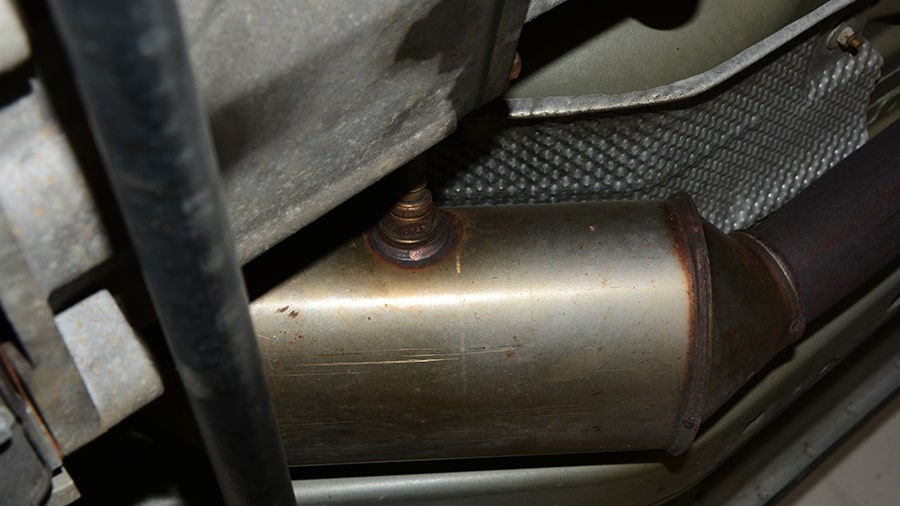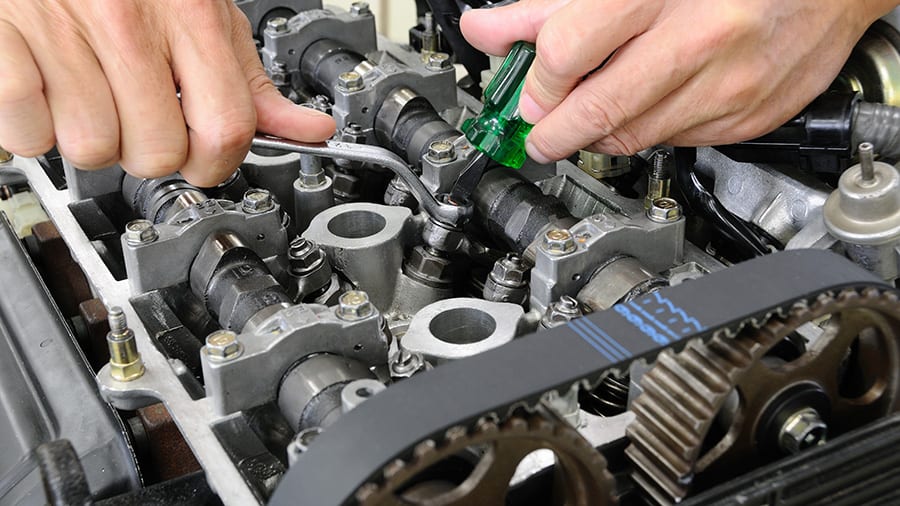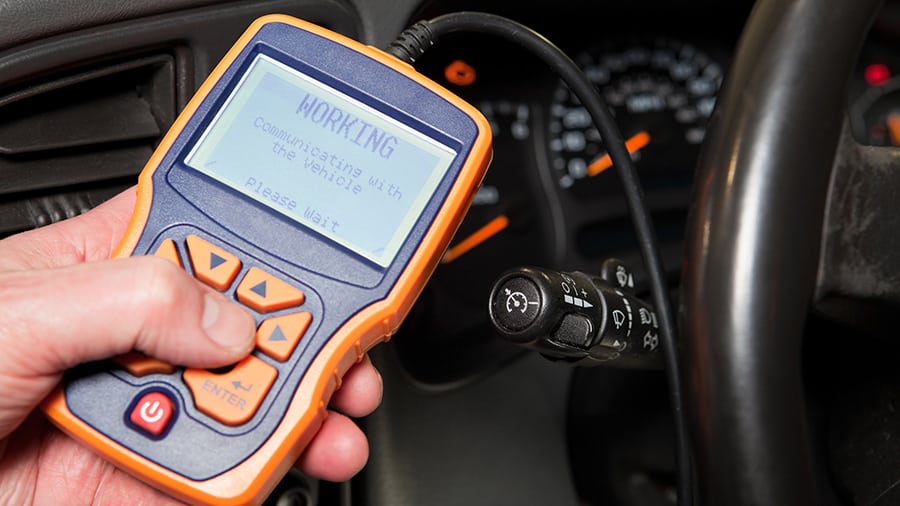Engine Loses Power When Hot? Try These Fixes
Experiencing a loss of power in your engine when it gets hot can be frustrating and puzzling. A clogged fuel injector is one reason you might find yourself stuck with this issue.
This article will guide you through identifying and fixing common causes of power loss as your engine warms up. Keep reading for solutions that’ll rev up your car’s performance again!
Engine Loses Power When Hot Causes
An engine can lose power when hot due to a clogged catalytic converter, carbon buildup in fuel injectors, electrical resistance, or compression issues. Identifying the specific cause is crucial for effective troubleshooting and repair.
Clogged catalytic converter

A clogged catalytic converter can make your engine lose power when it gets hot. It stops the exhaust gases from flowing out like they should. This makes the engine work too hard and weakens its power.
You might hear a rattle or feel the car struggle, especially when you try to speed up.
Fixing this problem usually means replacing the clogged part. Catalytic converters get blocked over time or if something inside breaks apart. If you keep driving with a bad one, it could hurt your engine’s performance even more.
Always check your exhaust system if your car starts losing power when it heats up.
Carbon buildup in fuel injectors
Carbon buildup in fuel injectors can lead to reduced engine performance. Over time, heat soak or low-quality fuel can cause deposits to accumulate on the injectors, resulting in clogs that hinder proper fuel delivery.
This can lead to a cascade of problems, such as misfiring, rough idling, and stalling. Regular maintenance and high-quality fuel are essential to prevent injector carbon buildup and maintain optimal engine performance.
If left unaddressed, carbon buildup in fuel injectors could worsen over time and cause severe power loss. Checking for symptoms such as rough idling or misfiring while accelerating can help identify potential issues with the injector’s functionality.
Electrical resistance
Regarding power loss in an engine, another culprit can be electrical resistance. This issue occurs when there’s a hindrance to the flow of electricity in crucial components such as spark plugs, ignition wires, or the fuel pump.
Over time, factors like worn-out plug wires or faulty ignition systems can increase resistance, causing the engine to lose power when hot. Identifying and rectifying these electrical issues is essential in maintaining optimal engine performance.
Addressing electrical resistance is vital as it directly impacts the spark igniting the combustion chamber’s fuel. Ignition issues due to high resistance can result in misfiring and overall power loss during acceleration.
Compression issues

Compression issues can lead to power loss when the engine heats up. Engine compression problems, such as incorrect valve timing or clearances, can result in inadequate pressure within the combustion chamber, reducing power output.
Detecting compression issues may involve conducting a compression test on the engine’s cylinders, which can help identify any irregularities in pressure. Addressing compression problems promptly is crucial for maintaining optimal engine performance and preventing further damage.
Compression issues can impact fuel combustion efficiency and overall engine functionality if left unattended. These problems may also contribute to increased fuel consumption and emissions, highlighting the importance of regular engine maintenance and thorough diagnostic checks for any signs of decreased compression levels.
Identifying the Cause of Power Loss
Determine the cause of power loss by conducting diagnostic tests and inspecting the fuel system components. For more detailed information on identifying and fixing engine power loss when hot, continue reading below.
Diagnostic tests

Several diagnostic tests can be performed to identify the specific cause of power loss when the engine heats up. Use an OBD-II scanner to check for any error codes that might indicate issues with fuel injectors, ignition systems, or cooling components.
Additionally, conducting a fuel pressure test and a compression test can help pinpoint potential fuel delivery or engine mechanical problems. Inspecting the coolant temperature sensor and the throttle position sensor is crucial in identifying electrical resistance issues contributing to power loss.
Finally, testing for exhaust back pressure can reveal if a clogged catalytic converter affects engine performance.
After performing these diagnostic tests and identifying the root cause of power loss when hot, exploring effective solutions to address these underlying issues and restoring the engine’s optimal performance is essential.
Checking for engine overheating
Checking for engine overheating
Check the coolant level regularly to ensure it’s within the recommended range. Look for any leaks in the cooling system and inspect hoses for damage. Ensure the radiator and fan function correctly, as they prevent engine overheating.
If you notice any overheating or power loss, immediately prevent further damage and consult a mechanic.
Regular maintenance is critical; checking for coolant leaks and ensuring proper functioning of the radiator can help mitigate power loss due to engine overheating. Keep an eye on the temperature gauge while driving, as sudden spikes could indicate potential issues with the cooling system or engine trouble.
Inspecting fuel system components
Inspecting fuel system components is crucial to identifying power loss when the engine heats up. Start by examining the fuel and air filters for clogs, as these can hinder proper fuel and airflow.
Check for potential fuel issues, such as clogged injectors or a malfunctioning thermostat that could lead to overheating. It’s also essential to inspect the plug wires for any signs of wear or damage and check the engine cooling system for leaks and blockages.
Regular inspections of these components can prevent power loss in the engine, ensuring efficient performance.
Regular maintenance of fuel system components is essential in preventing power loss when the engine heats up. Over time, deposits can build up on injectors, leading to clogs and reduced performance; thus, cleaning or replacing them is vital.
Solutions for Power Loss When Hot
Consider replacing faulty components like clogged air filters or exhaust systems to address power loss when the engine heats up. Regular maintenance and using high-quality fuel can also help prevent power loss in the long run.
Replacing faulty components
To address power loss when the engine heats up, replace faulty components such as clogged air filters, which can hinder airflow and reduce engine performance.
Additionally, check for a clogged exhaust system, as it can limit the expulsion of gases and lead to power loss. Verify if any plug wire issues may be causing misfiring or stalling of the engine, and address them promptly to restore optimal functioning.
Regularly inspecting and replacing these components when necessary will help maintain the engine’s efficiency and prevent potential power loss.
Regularly replacing worn-out parts like spark plugs or fuel filters is crucial. Moreover, addressing common issues like carbon buildup in fuel injectors can significantly improve engine performance and prevent power loss.
Regular maintenance
Regular maintenance is crucial in preventing power loss in the engine. Cleaning or replacing clogged fuel injectors and checking the water pump and cooling system can help maintain optimal engine performance over time.
Proper upkeep also includes using high-quality fuel and minimizing the risk of deposits building up on the injectors and causing reduced engine performance.
Inspecting for cooling system leaks blocked hoses, and radiator issues are part of regular maintenance to prevent engine overheating. Additionally, ensuring that fans are functioning correctly is essential for adequate radiator cooling to avoid power loss due to overheating.
Using high-quality fuel
Using high-quality fuel is essential for maintaining engine performance. Low-grade or contaminated fuel can contribute to carbon buildup in fuel injectors, causing power loss and decreased efficiency.
High-quality fuel helps prevent deposits from forming, ensuring optimal engine function and reducing the risk of stalling or failure. Ensuring your vehicle is consistently fueled with high-quality gasoline can significantly avert power loss when the engine heats up.
Moving forward in addressing power loss issues when hot, it’s important to consider common questions about this problem.
Common Questions About Power Loss When Hot
Why does my car feel like it’s losing power when accelerating?
When accelerating, your car may feel like it’s losing power due to clogged fuel injectors or a malfunctioning water pump. These issues can lead to reduced engine performance and overheating, causing the car to lose power during acceleration.
Deposits building up on the injectors from heat soak or poor fuel quality contribute to clogs. Cooling system leaks and radiator problems can lead to overheating and a subsequent loss of power.
Regular maintenance and checking for any possible fuel or ignition system issues are essential in preventing power loss in the engine when accelerating.
Why does my car suddenly lose power while driving?
A sudden loss of power while driving could be due to clogged fuel injectors, ignition issues, or a malfunctioning water pump. These problems can lead to engine overheating and power loss.
Deposits on the injectors from heat soak or poor-quality fuel can cause clogs and reduced engine performance. Additionally, cooling system leaks blocked hoses, or radiator issues may contribute to engine overheating and subsequent power loss.
If you experience this issue regularly, it’s crucial to consult a mechanic for proper diagnosis and resolution.
You identify why power loss is hot and essential for effective troubleshooting. Regular maintenance, such as cleaning or replacing clogged fuel injectors and checking the water pump and cooling system, can help prevent these issues in your vehicle.
FAQs
What causes an engine to lose power when it gets hot?
Sometimes, an engine loses power or stalls when it heats up due to issues like cooling system problems, sensor malfunctions, or engine failure.
How can I tell if my engine has a problem with losing power?
You can run engine diagnostics to determine why your car’s power is dropping. This test checks for typical troubles that might cause the engine to fail.
Can I fix my car’s engine at home if it loses power when hot?
Fixing a hot engine that’s losing power can be challenging. If you know about cars and have the right tools, you may handle some repairs yourself; otherwise, take your vehicle to a professional.
What should I do if my car starts stalling because of overheating?
When your vehicle begins losing power as it heats up, check for possible fixes using an engine diagnostic tool or visit a mechanic specializing in fixing engines.
Conclusion
In conclusion, addressing power loss in a hot engine involves identifying and resolving the underlying causes. Regular maintenance and using high-quality fuel can prevent such issues from occurring.
Consulting a mechanic is crucial if power loss persists despite these efforts. Taking proactive steps can help keep your engine performing at its best when facing heat-related power loss.
